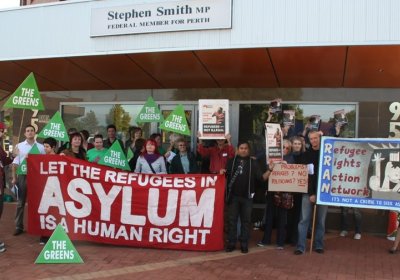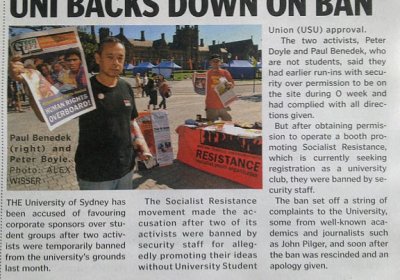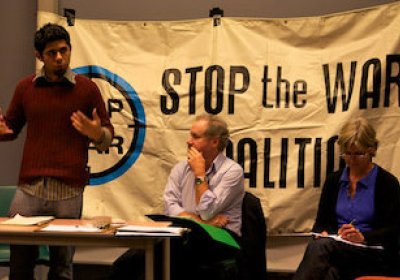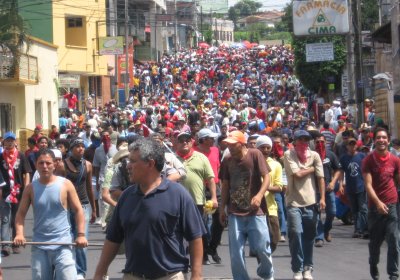In the Cochabamba football stadium on April 22, diverse indigenous peoples paraded around the track, thousands of local peasants sat in the stands, and thousands more activists from around the globe waved flags and chanted on the field.
A common sentiment flowed through the crowd: something historic had occurred over the previous three days during the April 19-22 World People’s Conference on Climate Change and the Rights of Mother Earth organised by the Bolivian government in Cochabamba.
835
On April 20, 200 angry protesters shouted down state police minister Rob Johnson, as he tried to justify the anti-democratic “stop-and-search” laws. The proposed legislation allows police to conduct potentially intrusive body searches without suspicion of a crime.
The laws would also allow the minister to make any space a “declared area”, which drastically increases police powers in that area.
The crowd was also addressed by Greens MLC Giz Watson, Labor opposition police spokesperson Margaret Quirk and Dr David Indermaur from the Crime Research Centre.
Forty refugee rights supporters protested outside Labor foreign minister Stephen Smith's office on April 23, demanding an end to the government's "freeze" on asylum-seeker applications from Afghanistan and Sri Lanka.
Speakers included Refugee Rights Action Network members Phil Chilton and Victoria Martin-Iverson, Socialist Alliance candidate for Perth Alex Bainbridge and Greens Senator Scott Ludlam.
The next action planned by the Refugee Rights Action Network is an overnight vigil outside the Perth Immigration Detention Centre on May 7.
Palestinian Ambassador to Cuba Akram Samhan told an event in Havana on April 17 that Israeli jails have locked up more than 760,000 Palestinians since 1967. The event marked the 35th Palestinian Prisoner Day.
The staggering number of Palestinians jailed by Israel is equal to 20% of the population of Gaza, the West Bank and Eastern Jerusalem. Samhan said this demonstrates that the occupying force has been met with Palestinian resistance that will continue until their homeland is free.
The March 15 banning of two Socialist Alliance activists, Paul Benedek and myself, from the University of Sydney was revoked on April 9, after vice-chancellor Michael Spence received a storm of protest letters.
Over April 19-20, Indonesian police and naval officers forced almost 150 Tamils onto buses at Port Merak and took them to the Tanjung Pinang detention centre. For seven months, more than 250 Tamils had withstood appalling conditions aboard a squalid boat at the West Java port.
Their hope was for refugee status in Australia. Their fear was of being locked up in Indonesian detention centres or deported back to Sri Lanka.
Clients at the Fairfield Migrant Resource Centre heard on April 29 that people in disadvantaged areas, such as Fairfield, could have their welfare benefits "quarantined" as early as next year.
The public meeting at the centre featured Peter Davidson from the Australian Council of Social Services and Richard Downs, spokesperson for the Alyawarr people’s walk-off in the Northern Territory.
The walk-off began in July 2009, protesting against the effects of welfare quarantining, and other NT intervention measures, in the community of Ampilatwatja.
Visiting Pakistani socialist and anti-war activist Ammar Ali Jan and Edmund Rice Centre director Phil Glendenning delivered powerful presentations on why the Afghanistan-Pakistan “war on terror” was a fraud. They spoke at a meeting organised by Stop the War Coalition on April 27.
Ali Jan said the US was facing a checkmate in Afghanistan after failing to find a credible replacement for the corrupt and increasingly weak President Hamid Karzai (also known as “the mayor of Kabul” for his limited political influence).
Israeli queer activists organised a protest on April 29 in front of the Israeli foreign affairs ministry in Jerusalem to protest against an “Israeli LGBT Festival” being organised in San Francisco called “Out in Israel”. The US event is funded by the Israeli consulate and Jewish organisations' together with support from the Israeli foreign affairs ministry.
About 90,000 people marched in Yomitan, Okinawa on April 25 to call for the closure of US Marine Corps Air Station Futenma, an April 29 Counterfire.org article said. Protesters included the governor and all the mayors of Okinawa.
Participants issued a statement calling for immediate closing and relocation of Futenma US Base outside Okinawa or the country.
The rally recorded a record-high participation in Okinawa, expressing public opinion against the base. In 1995, 85,000 marched in protest at the rape of a schoolgirl by US servicemen.
A military coup, backed by the United States, ousted a democratically elected government in Honduras on June 28, 2009. It has arrested, without trial, thousands of democracy activists.
More than 50 activists from the National Popular Resistance Front (FNRP) have been killed, and there are more than 100 other violent deaths related to the coup and curfews.
The lesbian, gay, bi-sexual, trangender and intersex (LGBTI) community is being particularly targeted.
Repression and resistance. These two words sum up Honduras today.
There is truly terrible repression — reminiscent of the Central American “dirty wars” run by US-trained militaries in the 1980s.
But there is also unprecedented resistance that has mobilised a previously compliant majority.
This is the situation that exists in the aftermath of the June 28 military coup last year that overthrew the elected president, Manuel Zelaya. Zelaya’s crime was to agree to the demands of a united front of social movements to start a democratic process of writing a new constitution
- Previous page
- Page 2
- Next page






